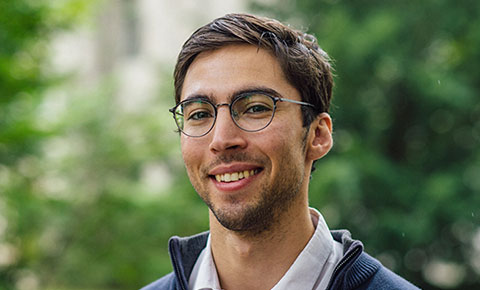Kelter Wins Presidential Fellowship

Jacob Kelter, who studies how the power of computer modeling and simulations can help solve some of society’s most complex problems, received the prestigious Presidential Fellowship at Northwestern University.
Kelter is a doctoral candidate in the joint Computer Science and Learning Sciences Program offered through the McCormick School of Engineering and the School of Education and Social Policy. His dissertation research involves creating computational models for making sense of complex systems and studying how students explore and modify the models to learn.
“Computer science pairs well with learning sciences because we can use computers to build powerful learning tools, especially by giving students greater ability to create things themselves,” he says. “We can also use computers to model and understand learning processes.”
Kelter is the fifth School of Education and Social Policy graduate student to win the award in the last seven years, and SESP's first learning scientist. Previous winners include Sheridan Fuller (2021), Heather McCambly (2019), Mollie McQuillan (2017), and the late Cynthia (C.C.) DuBois (2016), all graduates of the Human Development and Social Policy program.
As part of Northwestern's Center for Connected Learning and Computer-Based Modeling (CCL), a research group headed by professor Uri Wilensky, Kelter works with Wilensky’s programmable modeling environment, NetLogo.
Researchers use computational “agent-based” models like the ones in the NetLogo models library to study complex systems. In these environments large scale patterns emerge from the interactions of thousands of “agents”, whether they are atoms, animals, people, or organizations. These tools can also be used by students to hone their intuitions and make sense of how global patterns can emerge from the interactions of a system’s parts.
Kelter co-designs computational models of materials science phenomena (such as diffusion in solids and semi-conductor behavior) with materials sciences professors and helps them incorporate the new tools into the curriculum. As part of the CT-STEM project, he collaborates with high school teachers to co-design science curricula that include computational modeling and data analysis practices.
Kelter is also working on an agent-based modeling project to investigate an alternative voting system called quadratic voting which allows people to express intense opinions on different issues. And he collaborates with the Xalgorithms Foundation on agent-based models of economic systems and their interactions with the environment.
“Jacob is a leader in the application of complex systems ideas and methods to education, working to reconceptualize science learning using computational agent-based modeling representations,” said Wilensky, his dissertation advisor.
Kelter grew up in southern New Mexico and since graduating high school has alternated between Chicago and Israel. Before starting his PhD, Kelter co-founded Rise Science, to help people enhance their performance and quality of life by improving their sleep. (His own sleep schedule? At least seven hours a night.) He’s currently an advisor to the company.
In 2021, Kelter and graduate student Sarah Lee created a series of panel discussions and a seminar-style course with professors to explore educational philosophy. “So much of our work in Learning Sciences is value-laden, yet there hasn't been much opportunity to develop our own educational philosophies with feedback and discussion amongst peers,” he said.
The highly competitive Presidential Fellowship is funded by the President of the University and awarded by The Graduate School. Those selected take on a leadership role in the Northwestern Society of Fellows, which includes representing their respective disciplines and the broader graduate community in gatherings and discussions throughout the year.
Only six nominated PhD students a year are appointed to the Fellowship, and they are chosen for their outstanding academic efforts and leadership skills.